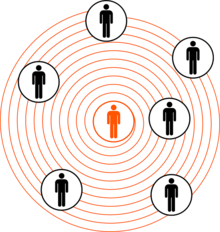
Egocentrism refers to difficulty differentiating between self and other. More specifically, it is difficulty in accurately perceiving and understanding perspectives other than one's own.[1] Egocentrism is found across the life span: in infancy,[2] early childhood,[3][4] adolescence,[5] and adulthood.[3][6] Although egocentric behaviors are less prominent in adulthood, the existence of some forms of egocentrism in adulthood indicates that overcoming egocentrism may be a lifelong development that never achieves completion.[7] Adults appear to be less egocentric than children because they are faster to correct from an initially egocentric perspective than children, not because they are less likely to initially adopt an egocentric perspective.[3]
- ^ Elkind, David (1967). "Egocentrism in Adolescence". Child Development. 38 (4): 1025–1034. doi:10.2307/1127100. ISSN 0009-3920. JSTOR 1127100. PMID 5583052.
- ^ Onishi, K. H.; Baillargeon, R. (2005). "Do 15-month-old infants understand false beliefs?". Science. 308 (5719): 255–258. Bibcode:2005Sci...308..255O. doi:10.1126/science.1107621. PMC 3357322. PMID 15821091.
- ^ a b c Epley, Nicholas; Morewedge, Carey K; Keysar, Boaz (2004-11-01). "Perspective taking in children and adults: Equivalent egocentrism but differential correction". Journal of Experimental Social Psychology. 40 (6): 760–768. doi:10.1016/j.jesp.2004.02.002.
- ^ Wimmer, H.; Perner, J. (1983). "Beliefs about beliefs: Representation and constraining function of wrong beliefs in young children's understanding of deception" (PDF). Cognition. 13 (1): 103–128. doi:10.1016/0010-0277(83)90004-5. PMID 6681741. S2CID 17014009. Archived from the original (PDF) on February 8, 2016.
- ^ Adams, G. R.; Jones, R. M. (1982). "Adolescent egocentrism: Exploration into possible contributions of parent-child relations". Journal of Youth and Adolescence. 11 (1): 25–31. doi:10.1007/BF01537814. PMID 24310645. S2CID 24937196.
- ^ Keysar, B.; Barr, D. J.; Balin, J. A.; Brauner, J. S. (2000). "Taking perspective in conversation: The role of mutual knowledge in comprehension". Psychological Science. 11 (1): 32–38. doi:10.1111/1467-9280.00211. PMID 11228840. S2CID 10659981.
- ^ Pronin, Emily; Olivola, Christopher Y. (2006). Encyclopedia of Human Development. Thousand Oaks, CA: Sage Reference. pp. 441–442. Retrieved 20 Oct 2014.